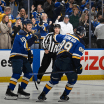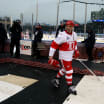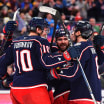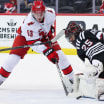Woodcroft says he wants Oilers to focus on present, not long-term goals
Coach discusses 'keeping our picture small' in Q&A with NHL.com

© Mitchell Leff/Getty Images
The 45-year-old took over as Oilers coach Feb. 10, replacing Dave Tippett. The Oilers (30-22-4) are 7-4-1 since he and assistant Dave Manson were promoted from Bakersfield of the American Hockey League.
"At the initial press conference, I talked about keeping our picture small, to make sure that we're focusing on our daily process, to committing to getting better each day, whether that's through rest or through traveling properly, through meetings, through practices or whether it's through executing come game time," Woodcroft said. "We're committing to be the best we can on a day-by-day basis."
The Oilers, who visit the Calgary Flames on Monday (9:30 p.m. ET; SN1, SNW, ESPN+, NHL LIVE), are two points behind the Nashville Predators for the second wild card into the playoffs from the Western Conference, a race that changes by the day with 26 games remaining in the regular season.
Woodcroft said he and the Oilers are aware of their position and the pressures that lie ahead, but at this point of the season, there is purpose in trying to steer players away from longer-term concerns.
"We're not being consumed with what other teams are doing," he said. "We're not going to worry about long-term scheduling. We're just taking care of one day at a time. When you focus your attention and you direct your energies toward one goal at a time, I think it serves the team well. So far, that's been something we've talked a lot about and that's what we're doing."
Woodcroft addressed the Oilers overall situation, as well as his transition to becoming an NHL coach with NHL.com.
Edmonton's goals against has improved since you became coach, allowing an average of 2.83 per game in 12 games after being 3.32 prior to your hire. How has that happened?
"When we came in a few weeks ago, we wanted to make sure we were precise in our messaging, precise in what we decided to focus our attention on and for us, that was our collective work back to our own zone. So, if you look at the goals against of the team, the total, we felt that for us to get to where we wanted to get to, it was an area that had to be addressed. So, we put a lot of emphasis on our work back to our zone, our organization coming into D-zone coverage and making sure that we were clear with what our responsibilities are. Through the first [12] games, I've been nothing but impressed with our players' commitment, their work ethic and their attention to detail. It's been excellent."
You seem calm, logical, focused. How did you get to be that way?
"I think everybody's a product of their influences. For me that began with my parents, my brothers, some really great coaches and teachers through the years and now I'd say my wife and children are huge influences on me. So, for me I think I have the benefit of some really good experiences in the game of hockey and I've learned from some really great hockey minds and just trying to push myself to be the best that I can be on a daily basis. I've been fortunate to have been around some really great people."
Those hockey experiences include having worked under Todd McLellan from 2008-15 in San Jose, then under him in Edmonton from 2015-2018, and previously as video coach under Mike Babcock with the Detroit Red Wings from 2005-08. What influence did they have on you?
"My first opportunity in Detroit with the Red Wings was essentially an entry-level opportunity on a coaching staff that included Mike, Todd, who went on to become his own head coach, and Paul MacLean, who went on to become his own head coach. And those teams in Detroit at that time, I think, the way they played the game has influenced a lot the way the game is played today. I learned not only from a great coaching staff but the players that were there … players of the stature of Steve Yzerman, Brendan Shanahan. Then the team was led by Niklas Lidstrom and Henrik Zetterberg and Pavel Datsyuk and that core group won the Stanley Cup in 2007-08. As a young man starting in professional coaching, I was exposed to the best players in the world competing at a very high level and being asked to play the game in a certain way and those ideas, those concepts, those principles, all began in that coaching room and those players went out and executed it to a very, very high level. So, it was a special time to be a young man in the coaching community.
"After that group won the Cup, Todd McLellan landed the job as head coach of the San Jose Sharks. That staff, again, had a lot of quality people on it. Todd Richards went on to become his own head coach in the NHL. Trent Yawney had been a head coach with the Chicago Blackhawks and has been a great assistant coach for a long time. So, along the way, you're learning from different people and their experiences. You share ideas and try to be open-minded and hard-working. Larry Robinson eventually joined the coaching staff. To be able to pick his brain and learn from his experience both as a player and as a coach in the NHL for a long time, well, I was an impressionable young man and I tried to have my ears open and learn as much as I could from some of the best hockey minds in the game. And so for me, I've tried to apply that mindset of being a student of the game and learning as much as I could and as I said, I'm very fortunate because I've been in the rooms with some of the brightest minds in hockey."
How instrumental was your experience as coach of Bakersfield in the American Hockey League from 2018 to this season?
"First, for me personally, I had worked for three different organizations over 13 years in the NHL in different roles and I also had some international experience working for Team Canada at the 2015 World Championship and also at the World Cup of Hockey in 2016. All wonderful experiences but the one thing I did not have at the time was the experience of running my own bench, of being my own head coach. And when I was presented with the opportunity to do that in Bakersfield, it made me think that if one day I wanted to become a head coach in the NHL, I had to answer that question and I had to tick off that box on my resume to show that I had the ability to lead a team on my own. When I did make that decision, I can tell you that I felt alive in a whole new way and that experience has served me well because when you're in the AHL, you're tasked with a few different things. The first and most important is to develop assets or develop players for the NHL team. And our staff, when we took over there in Bakersfield, felt that it was also important to do that in a winning environment. And that experience over three and a half years for us has served me well now because a lot of the players that are populating the bench for the Edmonton Oilers have come through the program in Bakersfield. So, I think a lot of the players here know me as a head coach in Bakersfield and some of them know me as a former assistant coach of the Oilers but I have a lot of built-in relationships over the course of eight years in the organization. So, I think that has helped ease the transition."

















